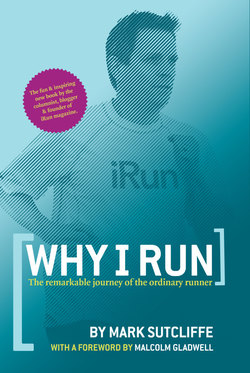Читать книгу Why I Run: The Remarkable Journey of the Ordinary Runner - Mark MDiv Sutcliffe - Страница 17
На сайте Литреса книга снята с продажи.
Competing against yourself
ОглавлениеiRun to run my own race Colleen Sheppard, Ontario
When you compete in a race, who are you really racing against? At the New York City Marathon, it’s thousands of other athletes. At smaller events, it might be fewer than 200.
But are you racing against those other runners or racing with them? For a handful of people who have a shot at winning, it really is a competitive race with real opponents. And I suppose if your archrival is in the same event and you want to be waiting for him at the finish line with a satisfied look on your face, you may believe it’s a true contest.
If you’re the typical runner, though, you are competing against only one person: yourself.
While to some people that might sound like a cliché you’d throw at your kid to teach him sportsmanship, it’s the prime motivation for most runners.
It’s not that they aren’t competitive, but most have shifted those instincts away from others and toward themselves.
Sure, you can look at someone who can do a 2:30 marathon and wish you could go that fast. But one thing that appeals to me about running is that far from being your opponents, the people around you are a source of inspiration and encouragement.
Whenever I’ve been training, I’ve met many athletes who are all working toward largely the same personal goal: to go farther or faster. I’ve met people who are trying to qualify for the Boston Marathon. I’ve heard stories about people who didn’t finish their first attempt at a marathon and are training hard to try again.
If you’re like most runners, the toughest and most worthy competitor you’ll ever face is yourself. And when you go farther or faster than you ever have before, that’s more satisfying than beating any other opponent.
That’s why so many runners talk regularly about their personal best times, or “PBs.” The PB reflects the peak of your own performance, and a standard you may still be trying to beat. Most athletes know their own by heart, down to the second.
In 2004, I finished a half-marathon in just over an hour and forty-four minutes. I was hoping to break 1:50, so I was pretty happy with that.
On training runs, I still picture myself breaking the tape at the finish line of an important long-distance race, to the shock of Kenyans far behind me, but I’ve accepted the fact that outside of my dreams, I may never even qualify for Boston. But if you test the limits of your abilities, you might find that although you’re in the middle or back of the pack, you may be faster than you thought. That’s what happened to me when I started training a little more intensely in 2006. I started running shorter distances at speeds that suggested I had the potential to do better times in my longer races.
Of course, all those indicators mean nothing once the race starts, which is why I was a little nervous before running the a half-marathon in which I hoped to set a new personal best. I was aiming to finish in just under 1:40. But to maintain that speed over 21.1 kilometres still seemed impossible to me.
Thankfully, the weather co-operated. I stuck to my race plan of maintaining a steady pace of 4:45 per kilometre, avoiding the temptation to speed up to catch friends who were ahead of me.
All race, I felt right on the edge between comfort and pain, as if I was pushing myself, but not so hard that it would cost me in the final few kilometres. I was right where I wanted to be.
I tried to avoid looking at my watch too often, in case it had bad news for me, or such good news that I might start to worry about burning out.
With half a kilometre to go, I saw my coach, Rick Hellard, on the sidelines. Rick had already won the race in 1:13 and was wandering back up the course. He looked at his watch.
“You’re under 1:37,” he said as I ran past. “You’ve got lots of time. You’re going to get a PB!”
Just what I needed to hear. I felt a surge of energy and picked up the pace. In the final 200 metres, I could see the clock ahead of me: 1:39:35 ... 1:39:36 ... 1:39:37. I started sprinting, surprised that I had some excess energy left this late in the race. I crossed the finish line at 1:39:51. My actual time from start to finish, which takes into account that I was at the back of the pack when the gun went off, was 1:39:17.
I hit my goal with more than forty seconds to spare. I beat my previous best time by more than five minutes. I outdid my biggest rival: my younger self.
